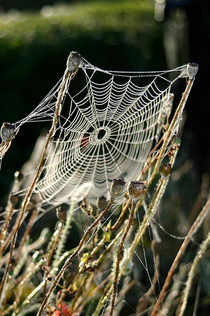 Spider web / FranceHouseHunt.com In last Monday’s post I complained about my meditation coach wanting me to sit still with an empty mind and forego studying dharma. There was no avoiding the defiance that followed. My negative reaction to being told what to do on Tuesday continued into my Wednesday therapy appointment. I spent most of those 50 minutes kvetching about people who tell me to do things I’d prefer not to do. Yet even as I smote my breast and berated authority figures, I longed for the therapist to tell me to stop. I was disappointed with both of us. Didn’t she know I was wasting our time. By the time it was Wednesday again, I arrived at therapy with a useful image in mind, an image that provided a paradigm for the purpose or purposes of meditation teacher Tuesdays and therapist Wednesdays. I imagined my life as a spider’s web in the making; attaching to different trees, each anchor becomes essential for supporting the ultimate interconnected creation. (See www.haworth-village.org.uk/nature/how/spider-web.asp.) But unlike the spider and her trees, I attach to people. Thus my web symbolizes the life I construct, the life I live in. One anchor is a meditation coach, another is a therapist, a third is a personal trainer, another is my friend and editor, Kate. There is the Kalyana Mitta (dharma friends) group that meets on alternate Thursdays, the sangha in the East Bay, the Civic Center Zen Center, the women’s group I facilitate one morning a week, and the meditation group that meets in the chapel at the San Francisco Unitarian Universalist church on Wednesday nights. Each point of connection serves a different and valuable purpose. I did not realize just how separately significant to my life each person is until I imagined my constructed life in the shape of that spider’s web. Until I realized that time with a Zen teacher is not a warm and cuddly encounter with a therapist. The role of this teacher is say outright what she sees as blocks to my awakening. And if I have hurt feelings as she asks me to open to understanding, I better not expect her to apologize. And though I have no future as a monk, by taking a teacher, I am learning what it means to trust her, to allow her to be my “dangerous friend” as a teacher is called in the Tibetan Buddhist tradition. On the other hand, I need to know my therapist likes me. I want to know it over and over again. And with her, I work with the paradoxical discomfort of needing love and finding it difficult to tolerate being cared about. Apparently in that encounter, what I wanted on Wednesday was what irritated me on Tuesday. Perhaps I need to learn to trust the therapist’s process as much as I am leaning to trust the Zen teacher’s work. The spider’s web I envisioned brought clarity. It showed me to pursue one goal in one place and the second goal in another place, much like Tuesday is not Wednesday nor vice versa. For if the spider attaches all her anchor strands to one spot, the construction will be pretty lopsided and not too many bugs will land. That would not be a skillful web. I have connected to my life with other strands such as to communities of like minded people at the War Memorial Opera House, Opera Plaza Theater, Davies Symphony Hall, etc. I often ride strands to Berkeley Repertory Theatre, the Aurora Theatre and sometimes to the Marin Theatre in Mill Valley. Although I didn’t envision a spider in the web of my mind’s eye; nevertheless, a stretch of imagination shows me at the center of such a web. I am okay with this because spiders are considered ancient symbols of mystery, power and growth. “When we see our decisions, choices and actions as far-reaching, effective tools in life - we can see how we weave a web that can either serve us or enslave us. The Spider symbol meaning beckons us to be mindful of our behaviors - be smart about the life we weave for ourselves.”* * http://sherryandrea.com/symbolic-meaning-of-the-spider/
 Porcupine at Mer Bleue /Robbie’s Photo Arts My meditation coach asked me not to take any more classes, not to study Buddhist teachings, at least not in the short term. Whether this prohibition against studying Precepts, Noble Truths or the Eightfold Path is a lifetime ban depends, I guess, on what kind of progress I make in the practice of sitting, rather than approaching Buddhism head first.
When she told me to limit my mental participation, I reacted with an attitude of defiance. How dare anyone tell me what to do!! And when I registered for a class at the East Bay Meditation Center for February and she objected, I said I had not taken a class in January; that must count for something. She did not think so.
Explaining why I have a coach in the first place and why she would limit my intellectual pursuit of Nirvana and suggest that time put into sitting was time better spent, I will save for another day.
Right now, what interests me is how I employed defiance in the past, and how that propensity to defy authority, even authority I have chosen, no longer seems useful.
At a recent Spirit Rock workshop, not a class, the 100 plus of us over 55 explored what resilience means to us as we age. I knew going to the workshop was not an act of defiance, as we were not studying Buddhism; we were sitting and sharing personal experiences.
We were asked to look at our lives and tell a story that demonstrated our ability to bounce back from a setback. In other words, what strengths of character do we bring to our aging? I chose to focus on what I once considered a character strength – defiance. This translates as “If it doesn’t feel in my best interest, telling me what to do is not going to work, even if you are a person in authority”
At the workshop, in groups of three, each of us told a story of a time in our past when we were resilient. I chose the account of how I did not drop out of college in the late ‘50s although the Dean of Women at the small Christian college told me that unmarried and pregnant, I was not welcome and had to leave school. I refused. Even as I recounted the event, I began to question how defiance translated into resilience. The other two in the triad had the job of telling me what my story revealed about my strengths. They said they saw in my story “courage, perseverance, determination, and integrity.”
Although I don’t mind looking back at that incident from the perspective of positive personal qualities, my own sense of what happened has more to do with a fierce unwillingness to be told what to do than with any recognizable strength. Back then, defiance kept me in school and eventually being graduated. I would call that skillful defiance.
But what about now? How skillful is it to deliberately defy the person I chose to teach me? In talking to my meditation coach about taking classes or not taking classes, my habitual mind expressed itself: “You can’t tell me what to do!” And, in response, she continued to remind me as I strung together arguments to justify taking the classes, that I chose her to be my teacher. Again and again she would interrupt my attempt to justify doing what I wanted to do, “You chose me.”
I spent several unhappy days resenting being told what to do. I complained to my therapist, wept to my friend, attempted to justify the feelings of defiance that worked so effectively throughout my younger life. Eventually, I decided that continuing to resist what I am told to do may not be in my best interests. Perhaps defiance is a tool in the emotional tool belt, so to speak, and not always the most useful the same way a hammer is not always as skillful as a screwdriver or pliers.
So for now no more classes or searching for additional information. I will just sit. As I continue on my spiritual path, I will let go of defiance for a while, trusting the meditation coach I chose. I am not sure where this will lead; I am willing to see.
 Georges Roualt’s Singer with a White Plume Overseas Adventure Travel or OAT as travelers like to call it is a relentless organization. It’s the excess of material flooding both my online and home mailboxes rather than the quality of their tours that’s incredibly annoying. Several years ago I did let them take me to Eastern Europe where my only legitimate complaint was gobs of pork on our dinner plates. I couldn’t hold OAT responsible for the heat in Prague or for my packing four jackets.
But such a deluge of mail! Early this week the post office dropped off a packet too hefty for me to manage, so a neighbor carted it upstairs and heaved it into the hallway outside my door. Apparently, Alan & Harriet Lewis like me well enough to send me a 299-page, World of Discovery in 2013. Harriet is personally encouraging me to see Turkey right away. Perhaps, I am a great favorite of hers. So far no tweets, a good thing.
By way of explaining why I may no longer be the best target for all the mail thrown at me by the Lewises of OAT, I reference the humanist psychologist Abraham Maslow. Maslow says, “The sacred is in the ordinary.... travel may be a flight from confronting the sacred. To be looking elsewhere for miracles is to me a sure sign of ignorance that everything is miraculous.”
I would not have chosen to use the term “ignorance” to characterize people who like going other places. Certainly genuine curiosity to see and know the world motivates me, yet I find the life I am living right now to be a source of great excitement, no matter how mundane its activities.
In Toward a Psychology of Being, Maslow writes about “the most wonderful experience of your life: the happiest moments, ecstatic moments, moments of rapture, perhaps from being in love, or from listening to music or suddenly ‘being hit’ by a book or painting, or from some creative moment.” These miraculous moments can be thought of as “peak experiences.”
I don’t seek miracles or even “peak experiences” – those blissful moments of discovery that increase awareness and understanding, that cause a loss of self-consciousness and a sense of connection with all – anywhere but where I am. None of my “peaks” took place on foreign mountaintops, nor even on the bullet train whizzing past Mt. Fuji when I lived in Japan.
Maslow said meditating in far off monasteries isn’t necessary nor is travel a requirement if one is to have an encounter that feels like a “peak experience.” And that has certainly been the case for me.
For me those moments of increased awareness and understanding, that loss of self-consciousness came from such disparate sources as a painting by Georges Roualt exhibited in a local gallery, the black outline transfixing me. An athletic contest played with consummate skill by a local team, and exquisite musical moments at the opera, many during the Ring Cycle at the War Memorial Opera House, which is within walking distance. In each peak experiences I was dumbfounded in a good way like I’d experienced an unrepeatable event, and I felt at one with the world, transfixed or transported.
Another of those nowhere-special, standout moments occurred when I was teaching journalism in Los Angeles and stayed late to experiment with page design. I was so in the flow of the activity that time and I disappeared into focus and detail. And another was seeing a short play I co-wrote with Corky, my then girlfriend, being performed in a playwriting workshop by equity actors. It was a peak experience watching two actors recreate Corky and me in a 20-minute snippet of our lives.
These moments are little miracles, “peak experiences,” during which I felt more at one with the world and myself. I have read that as we age, such peaks are likely to flatten into plateaus. The upside is that conscious diligent effort like meditation makes possible these gentler, more sustained states of serenity. It is my intention to feel happiness, even occasional ecstasy, interconnection and harmony without or despite persistent reminders from OAT to go somewhere else.
 Happy New Year, Grandma / AlisonR It got to be the new year. At 12:03 I jumped up from the couch and greeted the year in the usual way. My grandson, who had worked overtime until 11 o’clock, bolted upright from the recliner where he had fallen immediately to sleep, pulled out his ear buds and distractedly said, “Happy New Year, Grandma,” only to fall back into sleep. Rather than resolve to make changes or noticeably improve, I began this year by taking stock of the past year’s faits accomplis. Although I did not actually read How to Win Friends and Influence People in the past year, I figured out for myself what Dale Carnegie meant when he wrote, “It isn’t what you have or who you are or where you are or what you are doing that makes you happy or unhappy. It is what you think about it.” Last year I took Carnegie a step further by realizing it’s not what I think as much as that I think. Through the preceding year, sitting in meditation helped me separate from thoughts enough to see them come and go. With this increased awareness, I noted the extent to which I practiced self-aversion throughout the year. Although the past year was not the first time shortcomings took center stage, it was the year I began to treat them with curiosity and loving kindness. I took to heart the words of Albert Einstein: “Everybody is a genius. But if you judge a fish by its ability to climb a tree, it will live its whole life believing that it is stupid.” So that’s what it has been about. It’s easier to imagine that I simply misjudged myself and have been harsh to no purpose. Moreover in 2012, I played with the practice of limiting my inner conversations to all words except personal pronouns – subject or object, singular or plural. Each try filled my head with haikus. An interesting experience. Tree-high fish most strange Not meant for height, needing depth Lies to nature’s face. I expect the new year, like the last one, will see me getting older. Knowing how aging begets forgetfulness, I have these words from Friedrich Nietzsche for consolation: “The advantage of a bad memory is that one enjoys several times the same good things for the first time.” That is great because I did read Lord of Misrule by Jaimy Gordon, as if for the first time and suddenly remembered liking the book a lot the real first time I read it. Each experience was different This is not to say that forgetting didn’t carry a price tag in 2012. I missed the Dec. 10 deadline for property tax and had to pay the lateness penalty. Good idea to attach to the refrigerator along with tickets to upcoming theater performances, everything that needs remembering. I know I didn’t remember commitments just as I didn’t remember the myriad passwords I created on the spur of the moment for each new phone app or website requiring a password. But as the year came to an end, I learned to count on the calendar in the cloud. This year, every commitment I make at the moment I make it will leave a calendar trace. Less double booking Overlooking promises Aloft in the cloud. I lived an unplanned year in 2012 and still managed to learn and accomplish enough acts of random kindness to consider the year successful. In 2013, I anticipate more faits accomplis to contemplate at the end of the year. I have my bits of wisdom from last year to look at, a head full of haikus, useful information in the cloud, intentions to sit in silence and stillness. And there are always clever people expressing wisdom I can learn from. For example, Charles de Lint, who writes science fiction shares this truth: “It’s all a matter of paying attention, being awake in the present moment, and not expecting a huge payoff. The magic in this world seems to work in whispers and small kindnesses.” Whispered kindnesses Silent moments of wisdom Paying attention. Happy New Year!!
|




 RSS Feed
RSS Feed